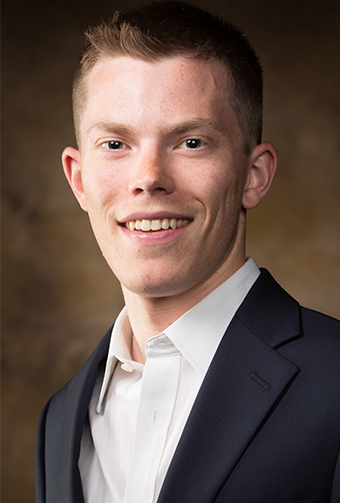Department of Civil Engineering
4190 Bell Engineering Center
Fayetteville, AR 72701
Phone: (479) 575-4954
Fax: (479) 575-7168
Civil Engineering Doctoral Candidate Receives Honorable Mention from Ford Foundation

Sean Salazar, a civil engineering doctoral candidate, was given the distinction of an Honorable Mention in the 2018 Ford Foundation Dissertation Fellowship competition. The national competition invites applicants from a diverse range of research-based Ph.D. or Sc.D. fields, ranging from computer science to history, education, social sciences, and engineering among many other eligible programs. The Ford Foundation Fellowship Programs are administered by the National Academies of Sciences, Engineering, and Medicine. This year, the dissertation program, designed to support doctoral candidates in their final year of dissertation writing with a $25,000 award, received 600 applications and awarded 36 fellowships. The selection criteria for the fellowship include demonstrated superior academic achievement, commitment to a career in teaching and research at the college or university level, promise of future achievement as scholars and teachers, and preparation to use diversity as a resource for enriching the education of all students. In addition to the dissertation fellowships, the Ford Foundation Fellowship Program also offers predoctoral and postdoctoral fellowships. For more information about these competitions, visit http://sites.nationalacademies.org/pga/fordfellowships/index.htm.
Sean earned a B.S. and M.S. in civil engineering from the University of Arkansas. He is advised by Dr. Richard Coffman and is currently working toward his doctoral degree in civil engineering with an emphasis in geotechnical engineering. Sean’s research is focused on remote sensing techniques for geotechnical engineering and civil infrastructure applications, which include natural hazards such as unsaturated soils and post-wildfire debris flows. Sean is currently developing a field deployable lidar instrument for measurement of soil properties. The instrument is based on technology that was developed at the bench-scale for remotely measuring soil moisture, soil suction, clay content, and plasticity. The laboratory experiments showed potential for adapting the technology to field applications where they might be used for dams and levees, forensic investigation of geohazards, or the mining industry. As part of his research efforts, Sean has applied for two patents, authored six peer-reviewed journal articles, co-authored several publications, presented his work at national and international conferences, and has received multiple nationally competitive awards. Sean is a fellow of the National Science Foundation Graduate Research Fellowship Program (NSF-GRFP) and the NSF Graduate Research Opportunities Worldwide (NSF-GROW) program. He is currently completing a year-long research experience at the Norwegian Geotechnical Institute in Oslo, Norway. While at the Norwegian Geotechnical Institute, Sean has studied the impacts of natural hazards on the built environment, using cutting-edge remote sensing techniques including radar interferometry (InSAR), gigapixel photography, and drone-based photogrammetry. Sean will return to the University of Arkansas in the summer of 2018 to complete his final year of his doctoral program.